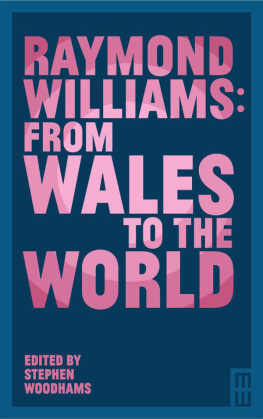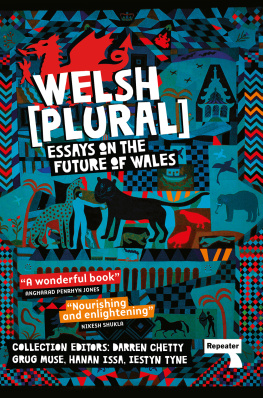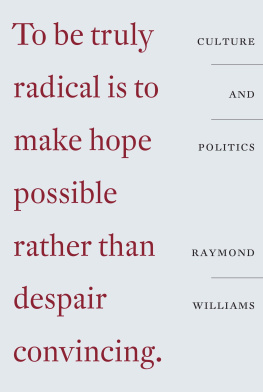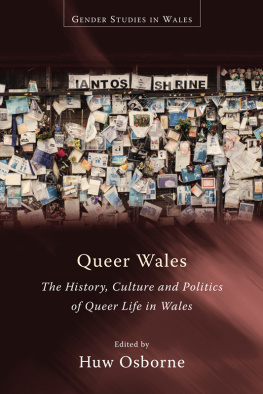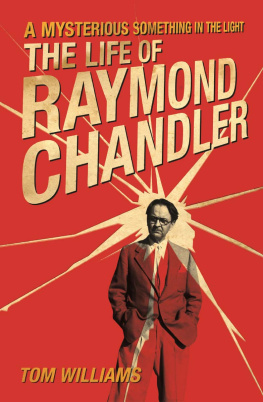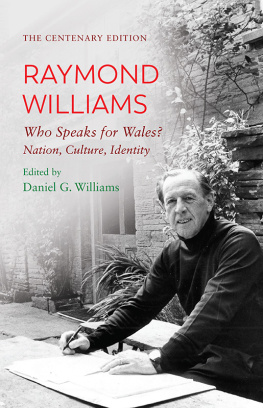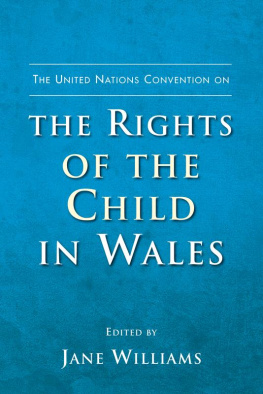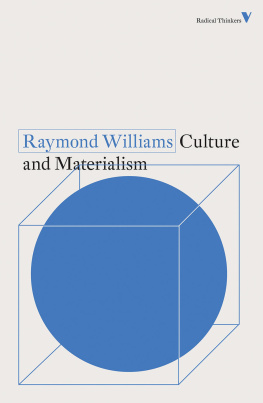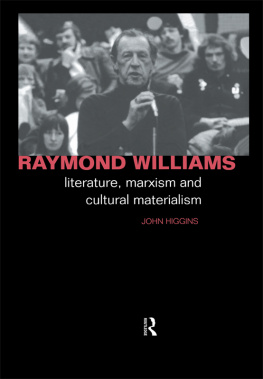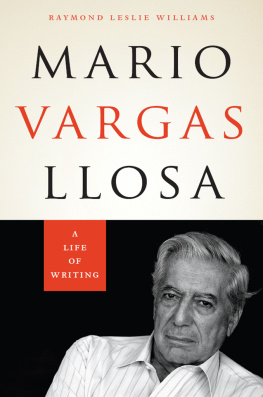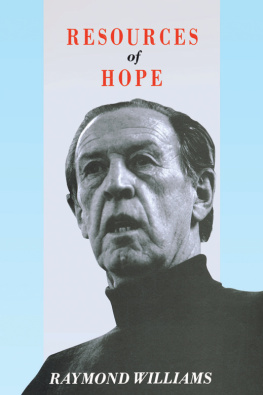RAYMOND
WILLIAMS
FROM WALES TO THE WORLD
Stephen Woodhams lives in East London where he has worked and written on Raymond Williams over a number of years. He is a Trustee of the Raymond Williams Foundation.
RAYMOND
WILLIAMS
FROM WALES
TO THE WORLD
EDITED BY
STEPHEN
WOODHAMS

Parthian, Cardigan SA43 1ED
www.parthianbooks.com
First published in 2021
2021 The Contributors
All Rights Reserved
Hardback ISBN 978-1-913640-92-7
eISBN 978-1-913640-93-4
Cover design by www.theundercard.co.uk
Typeset by Syncopated Pandemonium
Printed and bound by 4edge Ltd
Published with the financial support of the Welsh Books Council.
The Modern Wales series receives support from the Rhys Davies Trust

British Library Cataloguing in Publication Data
A cataloguing record for this book is available from the British Library.
Contents
My father always considered himself a Welsh European, and these essays offer an illuminating study of this aspect of his identity.
Merryn Williams
Commendations
Steve Woodhams, author of History in the Making, a fabulous pioneering study of Raymond Williams, E. P. Thompson and the British New Left, brings another excellent contribution to the field, this time taking Williams as sole protagonist. Raymond Williams: From Wales to the World offers significant insights into Williams as a Welsh European, who taking his ground in the border country, engaged the world beyond. This book deserves to be widely read; affirming the life and work of Raymond Williams continues to those of us who care for democracy, common culture and communalistic values.
Yasuo Kawabata, Chair of Raymond Williams Kenkyukai (Society), Tokyo
Raymond Williams, who was my teacher at Cambridge, was an extraordinarily perceptive critic of culture. He was deeply rooted in Welsh culture and tradition; but as Stephen Woodhams has so ably demonstrated, Williams ideas, concepts, methods of analysis have a bearing on cultural hermeneutics in other parts of the world. Woodhams has established cogently the global relevance of Raymond Williams. This is a first-rate book that situates Williams in a newer context of understanding.
Wimal Dissanayake, Raymond Williams through Sri Lankan eyes, Hawaii and Sri Lanka
Crossing borders real and imaginative, this work acknowledges Raymond Williams to be a significant European thinker in contemporary society.
Monika Seidl, About Raymond Williams, Vienna
Raymond Williams: From Wales to the World is a valuable contribution to studies of Raymond Williams, especially situating his work in relation to the social history of Wales. The book identifies Williams differences from other contemporary theorists such as Louis Althusser, and his dialogue with the ecological writings of Rudolf Bahro, with whom Williams shared a commitment to fundamental democracy. The guide to sources, including audio-visual material, will be invaluable for readers of Williams extensive work. The book makes a convincing case for Raymond Williams as a Welsh European.
Alan OConnor, Raymond Williams, Toronto
Wales, situated immediately to the west of England and Bengal situated ten thousand kilometres east of England are both border countries. In engagement with one of Williams contemporaries, I have felt a politico-spiritual camaraderie between Wales and Bengal, in among other things, our love-hate relationship with England. The life and work of Raymond Williams connects us, minds that live and die in the creative tension of margins. I can only congratulate Steve for giving us impetus to recognise the relevance of Williams for those of us outside European borders.
Sunandan Roy Chowdhury, Sampark publishing house, Kolkata
Raymond Williams belonged to that most original generation of interwar intellectuals and activists yet knew where he came from and what he came to say. Raymond Williams: From Wales to the World makes these origins and their effects clear. More than that, it convincingly demonstrates that however rooted to a particular place and people, Williams was also a cosmopolitan world figure. He spoke to us all, with what is now recognisable as a Welsh accent, and deserves to be read everywhere.
Michael Merrill, New York
Acknowledgements
This book has been in the making far longer than decency should permit, and I would like to thank all involved for their forbearance. I have certainly learnt much, working with people from varied backgrounds; the contrasts between their chapters has been both informative and enjoyable. A warm thank you to Merryn Williams for support over the books long gestation; the recent revival of Raymond Williams work owes much to her labours. Related to Merryn, genial thanks go to the home of the Raymond Williams Papers in Swansea, and especially Katrina Legg the Archivist, who assisted in numerous enquiries. Acknowledgement is extended to the Raymond Williams Foundation and Raymond Williams Society for support over the years. Many people have given intellectual stimulus, and appreciation is offered to Michael Rustin, the late Paul Hirst, Dai Smith, Daniel Williams and Yasuo Kawabata. During the writing of this book, lights have gone out in the world, and the passing of Eric Hobsbawm and Stuart Hall are losses we share in common.
A warm thank you to Bob Foster for his encouragement and for producing the graph on based on an original that appeared in Gwyn Williams When Was Wales?
Warmest wishes to Shivdeep Grewal for keeping the mind exercised. To Parmod Khokhar, Margarida Sousa, the two beings named Tiny and others on more than two legs for the best years of life. Amid painful experiences, this book has been a sanctuary sustained by special people. Their names are not given here, but they know who they are thank you for being there.
A sincere thank you to every one associated with Parthian Books for the excellent efficiency and good nature that has made this book possible.
This book together with others appears in the centenary of the birth of Raymond Williams and gratitude must be paid to all those who are working to make the occasion of lasting value by placing Williams as a figure not only of historical significance but one who speaks to our times and the future.
Stephen Woodhams
1
Wales and Beyond
Stephen Woodhams
Raymond Williams has never been a figure easy to place. His self-description as Writer encapsulates much of the reputation yet leaves sufficient open to be explained. A consequence has been closer attempted designations, of which perhaps best known is Cambridge literary critic. Though commonly used, this however limits Williams by place, tradition and intellectual scope and fails to comprehend the breadth of his engagement. The acclamation, founder of cultural studies, is not unrelated to literary critic, but captures the idea that Williams moved on, as it were, from Culture and Society to The Long Revolution, engaging with continental European thinking where, from the early twentieth century, the study of culture was understood and accepted as a science. Other titular headings have followed; European intellectual overtly places Williams in a series of twentieth-century figures and has the advantage of situating him among his contemporaries on a broader more appropriate scale. Each of the headings helped fill out the envelope, adding substance, yet we need still the generic term of writer if the full body of work and its creator is to be kept as a single whole.
Next page
